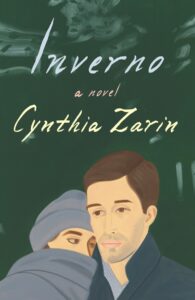Inverno, Cynthia Zarin’s first novel, eschews the classic structure of beginning, middle, and end. It captures, through the protagonist Caroline’s recollections of a relationship, the way life can’t be easily contained in three acts. Instead, Caroline’s peaks and valleys are hard to pin down — and the beginning and end of her story are ever altering points in time.

Zarin, daughter of the late Michael Zarin who served on the board of the Wellfleet Harbor Actors Theater, is no newcomer. A senior lecturer in Yale’s English department, she is the author of six collections of poetry, including the Los Angeles Times Book Prize-winning collection The Watercourse (2002) and has been a regular contributor to the New Yorker since 1983, where she has written extensively on books and theater.
Inverno is a novel only a poet could write. Every sentence earns its place, and what matters more than a straightforward narrative are the feelings and textures that make up life’s experiences.
The novel begins in the early 2010s with Caroline, an affluent, middle-aged New Yorker, waiting in Central Park in the falling snow for a phone call from Alastair, an on-again, off-again lover she has known since she was a child. The intention behind the anticipated conversation, whether a reconciliation or an argument, is unclear. What is evident, however, is how much he — or the idea of him — has occupied Caroline’s consciousness for over four decades.
As Caroline stands in the snow, she recalls how in that same spot Alastair, then age 15, crouched, “writing his name in the frozen dirt by the ball fields with a stick.” The memory, though 40 years old, is written in the present tense. For Caroline, the past can appear with the same vividness as the present.
“Someone you haven’t seen in 15 or 20 years may be more real to you than the people you see every day,” she says.
Caroline and Alastair’s relationship is revealed through vignettes written in piercingly poetic prose. We witness an intimate moment when, in their 20s, Caroline embraces Alastair. She can still remember “the smell of starch and tobacco that came off his skin.” The narrative suddenly skips ahead 30 years, with the two chatting online, Alastair in Maine typing in his little room over the garage and Caroline in her New York study, “staring at the blue screen, a pooling willing him to appear, which he did, talking in tongues.”

Throughout these recollections, Caroline has recurring thoughts about Hans Christian Andersen’s The Snow Queen, the character Etta Place in the film Butch Cassidy and the Sundance Kid, and songs about telephones. The culture we are immersed in, Zarin says, plays a large part in how we contextualize and process our own lives.
Each of the novel’s 132 pages captures the tangled knots of thought and memory in Caroline’s understanding of her relationship with Alastair. And in the end, what that understanding is, whether Caroline desires to revive their love or escape him once and for all, is left for the reader to decide. Easy definitions go against the poetic logic at the heart of Inverno. “What is the truth, still?” Zarin writes. “The truth is that she has never loved anyone the way she loves Alastair. Or loved Alastair. It makes no difference; it doesn’t matter what you say today or tomorrow.”
Inverno is not an easy novel, and at times its hopscotching through time and space can make one dream of the simple joys of rising and falling action. It aims to be, as Zarin puts it, “a novel in the midst of life.”



